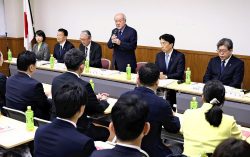17:19 JST, April 13, 2022
TOKYO (Jiji Press) — Prime Minister Fumio Kishida has hinted at further use of nuclear power as energy prices soar due to the Ukrainian crisis.
Behind Kishida’s move are growing concerns over how to ensure stable electricity supply following the government’s decision to ban coal imports from Russia in stages as part of its sanctions for the Russian invasion of Ukraine.
He apparently hopes to see whether nuclear power can be used as a stable energy source despite persistent distrust of nuclear power plants among the public.
Kishida announced the Russian coal phaseout at a news conference Friday. He also said that Japan will “maximize our usage of energy sources that are highly effective in terms of energy security and decarbonization, including renewable energies and nuclear energy.”
“Nuclear power is a baseload power source needed for decarbonization and is important in terms of stable [energy] supply,” Kishida told a plenary meeting of the House of Representatives on March 31.
Russia accounts for 11% of Japan’s total coal imports.
With coal prices soaring, the Russian coal phaseout is almost certain to affect citizens’ lives including through electricity rate hikes.
Meanwhile, rapid expansion of the use of renewable energy sources, whose output swings depending on the weather, is difficult, given the high costs to build related facilities.
“The only alternative is nuclear power. If the current situation continues, a massive power outage may happen in December or later,” a government source close to Kishida said.
Last month, the government issued its first power shortage warning in the service areas of Tokyo Electric Power Company Holdings Inc. and Tohoku Electric Power Co. to prevent a huge blackout caused by a lack of power.
The shortage largely stemmed from a special factor, namely suspensions of thermal power plants following a major earthquake off Fukushima Prefecture on March 16. But the warning caused anxiety among the public over the country’s power supply capacities.
According to its basic energy plan, drawn up in October last year, the government aims to raise the share of nuclear power to 20%-22% of the country’s total power generation in fiscal 2030 from only 3.9% in fiscal 2020.
Ten of the country’s 36 domestic nuclear reactors still in use have restarted operations since the March 2011 earthquake and tsunami, which triggered a nuclear accident at TEPCO’s Fukushima No. 1 power plant.
Currently, only five of them are in operation, including the No. 3 reactor at Kansai Electric Power Co.’s Oi nuclear plant in Fukui Prefecture.
The ruling Liberal Democratic Party said in a draft proposal of emergency economic measures penned Monday that Japan “will make the most use of various power sources to secure stable electricity supply.”
There is “no change” in the government’s policy of approving resumptions of nuclear power plant operations when the Nuclear Regulation Authority confirms that the facilities meet its new safety standards, Chief Cabinet Secretary Hirokazu Matsuno told a press conference the same day.
However, an LDP source complained about slow progress in the authority’s screenings, saying that the government “has procrastinated repeatedly to evade its responsibility.”
Opposition forces are criticizing the LDP and the government for their apparent eagerness to expand the use of nuclear power.
“It’s a big mistake if [the government] intends to rush things in a manner as when an emergency evacuation is conducted,” Sumio Mabuchi, parliamentary affairs head of the main opposition Constitutional Democratic Party of Japan, told reporters.
Taro Yamamoto, head of opposition party Reiwa Shinsengumi, warned against taking advantage of the Ukrainian crisis to drum up support for further use of nuclear power.
Top Articles in Politics
-

Japan PM Takaichi’s Cabinet Resigns en Masse
-

Sanae Takaichi Elected 105th Prime Minister of Japan; Keeps All Cabinet Appointees from Previous Term
-

Japan’s Govt to Submit Road Map for Growth Strategy in March, PM Takaichi to Announce in Upcoming Policy Speech
-

LDP Wins Historic Landslide Victory
-

LDP Wins Landslide Victory, Secures Single-party Majority; Ruling Coalition with JIP Poised to Secure Over 300 seats (UPDATE 1)
JN ACCESS RANKING
-

Japan PM Takaichi’s Cabinet Resigns en Masse
-

Japan Institute to Use Domestic Commercial Optical Lattice Clock to Set Japan Standard Time
-

Israeli Ambassador to Japan Speaks about Japan’s Role in the Reconstruction of Gaza
-

Man Infected with Measles May Have Come in Contact with Many People in Tokyo, Went to Store, Restaurant Around When Symptoms Emerged
-

Man Infected with Measles Reportedly Dined at Restaurant in Tokyo Station














